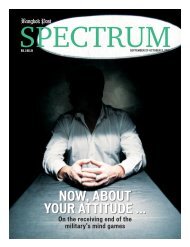spectrum
Spectrum-1524-Thailands-junta-silencing-its-critics-3-articles-in-a-series
Spectrum-1524-Thailands-junta-silencing-its-critics-3-articles-in-a-series
You also want an ePaper? Increase the reach of your titles
YUMPU automatically turns print PDFs into web optimized ePapers that Google loves.
4<br />
politics<br />
sunday, DECEMBER 6, 2015 Bangkok Post<br />
>> or more people and face the prospect of six<br />
months’ jail if found guilty.<br />
CLOSED TO CRITICISM<br />
The Ncpo issued the summons on Nov 10 and<br />
two weeks later the six accused and their supporters<br />
showed up at Chang Puek police station<br />
to report. They denied the charges.<br />
Among the supporters was Booncherd Nuim<br />
from Burapha University. Mr Booncherd, an<br />
assistant professor of sociology who teaches<br />
community development, had been at the Oct<br />
31 press conference but was not charged.<br />
Despite Mr Booncherd not being on the<br />
junta’s radar, he believes it’s important his students<br />
are encouraged to think critically about<br />
social problems. “If I don’t teach my students<br />
to criticise politics, then it will be difficult for<br />
them to understand what I am trying to teach,”<br />
Mr Booncherd said. “I can’t shut their eyes and<br />
ears. It’s normal to debate and interact in the<br />
classroom with rational reasoning.”<br />
Mr Booncherd is part of Mr Attachak’s nationwide<br />
research team looking at democratic<br />
change in rural areas, heading up the eastern<br />
region of the project. Although he wasn’t summoned,<br />
his position is no different from the<br />
other academics.<br />
“We have to be able to criticise anyone based<br />
on fact,” he said. “I am speaking for everyone, not<br />
for academics only. We have the right to criticise<br />
the government and we shouldn’t have to be<br />
scared of being controlled by anyone’s order.”<br />
IT GETS BETTER?<br />
Since the coup last May, Somchai Preechasilpakul,<br />
an associate professor of constitutional law<br />
at Chiang Mai University, believes free speech<br />
and the ability to express opinions, especially<br />
those opposing the NCPO, has become narrower.<br />
Mr Somchai, who has been lecturing since<br />
1993, was one of the academics charged by<br />
the NCPO.<br />
“One propaganda message that the<br />
government likes to say is that our country will<br />
get better and the situation will be better,” Mr<br />
Somchai said. “It has been more than a year but<br />
nothing has changed.”<br />
Mr Somchai said far from the country moving<br />
forward, it was going backwards when it came to<br />
freedom of expression in academic areas.<br />
He said the military had often sent him letters<br />
asking for his “cooperation” not to hold a seminar,<br />
regardless of what issue was up for discussion.<br />
He said as long as his name appeared on<br />
the list of speakers, the conference was either<br />
cancelled or heavily monitored by the military.<br />
“One time I was invited to be the guest speaker<br />
on the issue of LGBT rights,” he told Spectrum.<br />
“As soon as the military saw my name on the<br />
list, they sent someone to monitor me and make<br />
sure that I didn’t say anything they didn’t want<br />
me to say.<br />
“Do they even know what LGBT is? I don’t<br />
think so. They are just being paranoid.”<br />
Mr Somchai said he had been monitored by<br />
Somchai Preechasilpakul.



